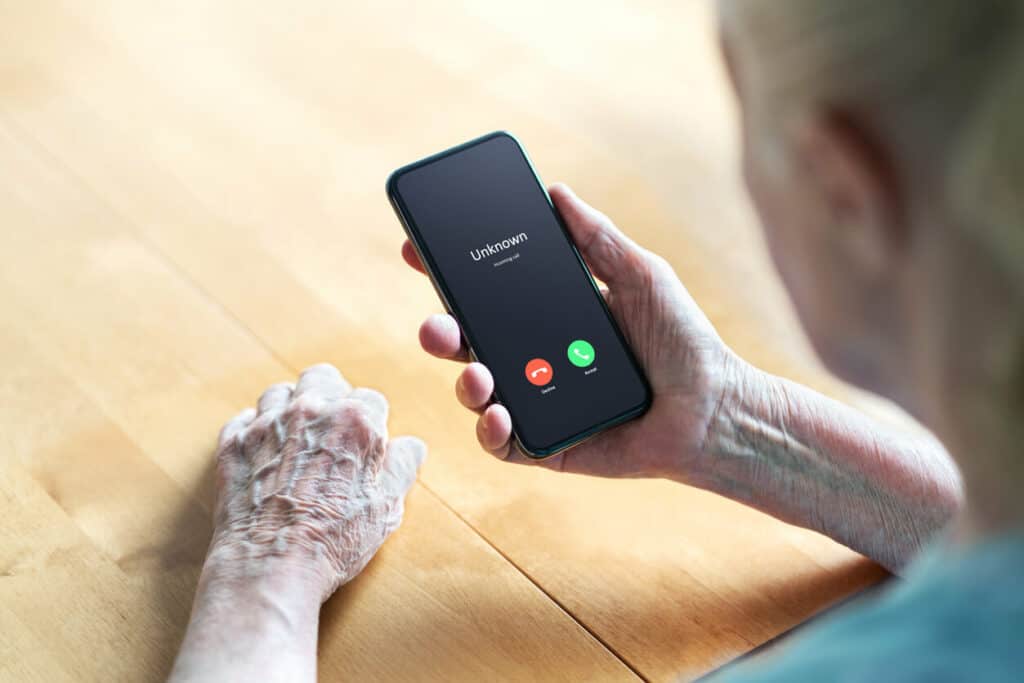Grandma is 93 years old and has been living alone since her husband died in 2005. Fortunately, her house is 5 minutes away from my sister’s. Grandma is a tough cookie; she goes grocery shopping, cleans, and cooks for herself. She loves to read and watch TV and is a passionate crossword aficionado. Other than depending on us to drive her places and carry, from time to time, heavier purchases for her, she is pretty independent and has her wits still.
One day last year she called me to say that her ‘daughter’ phoned her to ask for money. Apparently, her ‘daughter’ had had a car accident and was taken into a hospital about to undergo extensive surgery. The money was for the complicated surgical procedures, as there was a problem with her insurance. Luckily for Grandma, she has never had a daughter. She is my father’s mother, and he was her only child.

Sobbing uncontrollably as it seemed, the scammer on the phone told her to hurry up and prepare the cash, which an entrusted person, a friend, would come and pick up from her house. Grandma asked the woman for her name. The answer was, “It’s me, Mom, your daughter!” To which my grandma replied, “I don’t have a daughter!” and cold-heartedly hung up the phone.
I can’t recall what the sum was, but the instructions they gave her were to go to the bank, withdraw the money and say they were for bathroom remodeling in case the teller got suspicious.
According to the Federal Trade Commission’s report, imposter scams were on the rise in 2022, with $2.6 billion USD lost compared to $2.4 billion in 2021. Overall a whooping 8.8 billion were lost to fraud in 2022. No one is immune to scams, but seniors become more often subject to these than the rest due to their perceived vulnerability or potential financial resources.
Amy’s Eden has made it a call of duty to educate seniors and their loved ones about these scams and how to prevent them, or what to do if they have been a victim.
Why Are Seniors More Vulnerable To Scams?

Seniors’ vulnerability can be explained by one or more of these factors:
- The trusting nature of older adults. Many of the older adults grew up in times when people used to trust each other more. This makes them more inclined to believe what they are told and not suspect malicious intent.
- Having a more limited experience with technology. Seniors haven’t grown up with access to various social platforms and often don’t know how to check for misleading information. Scammers take advantage of this and often try to trick them with online scams, fraudulent emails, and text messages.
- Feeling lonely or living in isolation. This predisposes aging adults to enjoy strangers’ attention and welcome interaction with previously unknown people who may have malignant intent. Loneliness can cause seniors to let their guard down and become susceptible to emotional abuse and manipulation.
- Cognitive decline is another factor that con artists like to exploit. As our loved ones age, they may experience cognitive impairments, making it harder for them to recognize scams. This can affect their decision-making abilities and judgment, making them more prone to falling victim to deceptive schemes.
- Financial resources also motivate scammers to attack older adults. Perceived to have accumulation of assets or retirement savings makes seniors attractive targets for financial scams, investment fraud, or schemes promising quick financial gains.
Most Common Scams Targeting Seniors

To protect seniors, educating them about the different types of fraud and how to recognize and avoid them themselves is crucial. Some common swindles that have been gaining momentum in the past months and years are:
- Voice cloning parent or grandparent scams. Malicious people gather voice recordings of your speech, then feed them to an artificial intelligence (AI) program. It uses these snippets to generate utterances in a tone and pitch that carries an uncanny resemblance with your voice. The scammers then proceed to call senior family members and impersonate you asking them for money.
- Impersonating the government. In this type of scam, imposters call aging adults and pose as government representatives. They most commonly claim to be tax authorities, law enforcement agencies, or immigration departments, and they often target individuals seeking government services, benefits, or assistance. Scammers may ask for personal information and say that seniors could lose benefits if they don’t provide it; or demand unpaid taxes while threatening arrest if not paid immediately.
- Investment schemes. Fraudsters approach seniors with fake investment opportunities that promise high returns or guaranteed profits. These scams often involve Ponzi schemes, pyramid schemes, or fraudulent stock sales. Seniors may be targeted through phone calls, seminars, or unsolicited emails.
- Sweepstakes/Lottery Scams. Seniors get a call or a text message that they have won a large sum of money in a lottery or sweepstakes. However, they must pay taxes, processing fees, or other charges upfront before the prize can be claimed. In reality, there is no prize, and the scammers disappear once they receive the money.
- Tech Support Scams. These involve scammers posing as technical support representatives from well-known companies over the phone. Typically they claim that the senior’s computer or tablet has a virus or a technical issue and offer to fix it remotely for a fee. In reality, they may install malware or steal personal information. Scammers can also claim that they can help seniors track their refunds from various companies, from telecoms to insurance agencies.
- Romance Scams. Scammers create fake online profiles on dating websites or social media platforms and establish a relationship with a senior. They gain the senior’s trust and eventually request money for various reasons, such as travel expenses, medical emergencies, or financial hardships.
How To Help Seniors Avoid Being Scammed

The best form of prevention is awareness and preparation.
- Speak openly about the possibilities and encourage your older loved ones to open up by sharing stories of people you know who have been victims of scammers. Often, it may be hard for seniors to confess that someone has tried to con them because they find it embarrassing. However, everyone, regardless of age, can be tricked.
- Do not fall for the emergency of the situation. Instead, hang up the phone and try to call the person who claims to be someone you know.
- Set up a secret family code word with which to verify each other. You can use it when doing online transactions within the family to let the other person know you are the real you.
- Sign up for a credit monitoring service in order to protect against financial fraud. Various businesses or even your bank may offer this service. It alerts you via a text message or a phone call when any signs of fraudulent activities are detected. It can also serve as an insurance plan and restore up to $1M of losses due to identity theft, for example.
- Be vigilant about any suspicious calls, emails, or text messages. Knowing that these malicious practices exist and reminding your loved ones that they should always be a bit skeptical before taking any action can save you and them a lot of trouble.
What Can Victims Of Scams Do?
If you or your loved one think you have been a victim of fraud, the first thing you need to do is call the National Elder Fraud Hotline Office at 833–FRAUD–11 or 833–372–8311
Calling a fraud hotline for seniors will save you a lot of time and energy. It is a dedicated phone line established to assist in reporting and addressing cases of fraud, scams, or financial exploitation. Typically operated by government agencies or public departments, non-profit organizations, or law enforcement agencies, the senior fraud lines help protect seniors from financial and other types of crimes.
A call to a fraud line can help with:
- Reporting and Assistance: A fraud line provides a centralized and easily accessible point for seniors to report incidents of fraud or scams. Trained professionals on the other end of the line can provide guidance, support, and advice on what steps your older loved one can take to protect themselves, stop further financial loss, and report the incident to the appropriate authorities to carry out investigations.
- Information and Education: Fraud lines offer valuable information and educational resources to seniors to increase their awareness and understanding of common scams targeting older adults. Seniors can ask questions and receive tips on how to recognize and avoid scams, stay vigilant, and protect personal and financial information.
- Referral to Resources: Fraud lines often have connections to other agencies or organizations that specialize in elder abuse prevention, legal aid, financial counseling, or social services. They can provide referrals and connect seniors with the necessary resources and support systems to address the consequences of fraud or exploitation.
- Confidentiality and Anonymity: Seniors may have concerns about their privacy or fear retaliation when reporting scams. Fraud lines are confidential and allow seniors to remain anonymous if they wish, creating a safe space for them to share their experiences and seek help without fear.
- Data Collection and Law Enforcement Cooperation: Fraud lines play a crucial role in collecting data on scams and fraud targeting seniors. This information contributes to identifying trends, patterns, and emerging threats, enabling law enforcement agencies to take appropriate action, investigate fraudulent activities, create policies, and enhance fraud prevention efforts.
Overall, fraud lines for seniors serve as a valuable resource for reporting, prevention, and support. They empower elders to take action against scams, access information, and assistance, and contribute to the collective effort of combating financial exploitation targeting vulnerable people.
In addition to calling a fraud hotline, it can be also wise to follow these steps outlined by the Commodity Futures Trading Commission.
- Stop any ongoing or automatic payments to the suspected party.
- Gather all the documentation or information you may have regarding the case.
- Make an official report with the Federal Trade Commission (FTC) at these websites: identitytheft.gov and reportfraud.ftc.gov
Your Takeaway

Cybercrime, telephone imposters, and fraud targeting vulnerable seniors are on the rise. The fast-spreading of free AI applications only contributes to the problem of aiding scammers in their malicious intent.
In general, it is easier to prevent becoming a victim to swindlers than to recover losses after the act. For this, the best approach is to inform seniors what to expect, how to react during the event, and what to do if they suspect something unusual.
Having a fraud hotline number available to report fraud can alleviate a lot of the stress and prevent your loved one from becoming a scammer’s victim.
Need help with caregiving for your elderly loved one? Amy’s Eden has amazing caregivers that have been trained to provide exceptional care. You can also leverage the assistance of our caregivers to be the first point of contact for your loved one when they suspect senior scams.
Your loved one will also benefit from the companionship of the caregiver, and not have to welcome interactions from unknown people who may have negative
intentions.
Contact us to learn more about our various caregiving services and how we can help.




